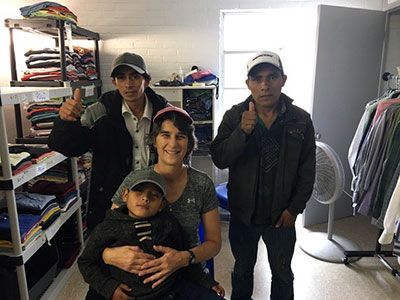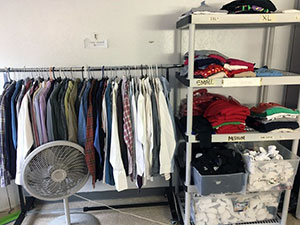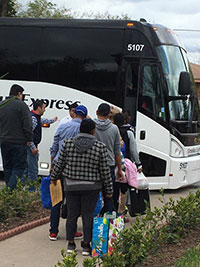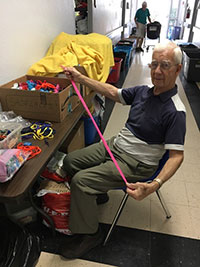 Cynthia Gibbs (center) is pictured in a borrowed pink cap, with a couple of the men who received baseball caps at the McAllen Humanitarian Respite Center in Texas. (Photos provided by Cynthia Gibbs)ASHEVILLE — The stories of many of the migrants Cynthia Gibbs encountered while volunteering in the border city of McAllen, Texas, touched her heart.
Cynthia Gibbs (center) is pictured in a borrowed pink cap, with a couple of the men who received baseball caps at the McAllen Humanitarian Respite Center in Texas. (Photos provided by Cynthia Gibbs)ASHEVILLE — The stories of many of the migrants Cynthia Gibbs encountered while volunteering in the border city of McAllen, Texas, touched her heart.
“I was helping a mom from Guatemala in the shoes room of the Catholic Charities-run McAllen Humanitarian Respite Center,” recalls Gibbs, a parishioner at St. Eugene Church. “I asked her if she had to cross the river since her own shoes were wet – how did she do it with her two girls, that were sitting near her, so quietly.
“She explained how she lifted and held on to her girls and showed me a bruise on her leg. Then she started sobbing and couldn’t stop. She had been traveling for four weeks, and I think she finally felt she and her daughters were safe. I hugged her, and she did not want to let go.”
For a month, Gibbs encountered hundreds of families a day while volunteering at the Respite Center, which provides temporary shelter for immigrants who cross from Mexico into the United States but who have been released by federal authorities.
The Respite Center’s goal is to restore human dignity to families, Gibbs says.
Gibbs, who in retirement remains active at her parish, was inspired to go to Texas after reading an email alert from the Sisters of Mercy South Central Justice in November. It said volunteers were needed at the border to assist with the overflow of immigrants, Gibbs explains. “This particular call to action hit me hard, and I could not stop thinking about it. I called Sister Rose Marie Tresp, and she helped me narrow down the choice of border cities looking for help to McAllen, Texas.”
The Respite Center is run by Sister Norma Pimentel, who has been praised by Pope Francis for her work with migrants. It helps immigrants – many of whom are seeking asylum and passing through the border city – have access to a shower, a clean change of clothes, a quick medical exam if needed, and a warm meal.
“I feel like I did not have a choice,” Gibbs says. “I was horrified when I learned that children were being separated from their parents at the border and the challenges these families faced. I finally had the opportunity to help and do something positive about it.”
Her husband Sam supported her call, and they paid for her airfare, hotel and car rental during her Jan. 8-Feb. 6 stay.
“I have a particular affinity for immigrants,” Gibbs explains. “My parents immigrated to this country from Italy. I also know some Spanish and have enjoyed working with the Hispanic community here at St. Eugene with tutoring and on St. Eugene’s Friendship Garden.”
Every day was different, Gibbs says. On her first day, she was given a tour of the facility – where the families enter the center; the room where a processor enters their data into a computer and the sponsoring family is contacted; the rooms used for sorting donations, the coats/sweaters room, the clothing rooms for children, men and women, the infant room full of diapers, powdered formula, clothes; the kitchen; the dining area; the room where sandwiches are made to give to the families as they leave; the rooms full of mats where the families sleep; the outdoor play area; the clinic; showers and bathrooms.
Instead of being assigned a station, Gibbs was allowed to choose where to help. She organized the women’s clothing room, then tackled the men’s clothing room.
“Since I received so many requests from the men and older teens at the center for baseball caps and belts, I put the word out that these items were sorely needed,” Gibbs says. “The following weeks, I can’t tell you how many boxes of donated baseball caps and belts were delivered to the center, but it was a lot! It was so much fun to distribute these.”
Besides helping stock the clothing rooms, Gibbs helped make snacks, assemble hygiene bags, translated for the nurse in the clinic and tied shoelaces together to be distributed.
“The biggest surprise for me was to find out that the border patrol confiscates everyone’s shoelaces, belts, baseball caps and wallets,” Gibbs says. “They all come to the center, young and old, without any shoelaces. Also, many of the adults are wearing ankle monitors and have to carry a shoebox-sized box with the charger for the ankle monitors.”
Something Gibbs wasn’t expecting was the gratitude she witnessed.
“I wasn’t expecting these exhausted, often traumatized families, to take the time to thank us volunteers,” she says. “I cannot tell you how many times I was told, ‘you are so kind,’ ‘God bless you’ and ‘thank you so much.’”
One man came back to the clothing room after his shower to show her how well his new clothes fit.
“He was all smiles,” Gibbs recalls. “I can still see that happy face.”
Small miracles and moments of grace like that happened every day, she says.


 “On one of the last nights of my volunteer stint, I ran out of men’s socks. It broke my heart,” she says. “The next morning, after I had gotten the word out that I desperately needed men’s socks, one of the men I couldn’t help with socks the night before stopped by the clothing room to show me how the ankle monitor he was wearing was rubbing painfully against his skin. He asked if I had gotten in any more socks.
“On one of the last nights of my volunteer stint, I ran out of men’s socks. It broke my heart,” she says. “The next morning, after I had gotten the word out that I desperately needed men’s socks, one of the men I couldn’t help with socks the night before stopped by the clothing room to show me how the ankle monitor he was wearing was rubbing painfully against his skin. He asked if I had gotten in any more socks.
“At that moment, one of our ‘angel’ volunteers stopped by the room with bags of men’s socks. I watched as he put on the pair of socks, a grateful smile on his face.”
That’s just one of many little moments that left an impact on her.
One of the biggest challenges for her was when she fell ill with a sore throat and laryngitis.
“I couldn’t talk for six days,” Gibbs says. She had printed cards with answers to some common questions, but not everyone she came in contact with could read so not being able to communicate became an obstacle for her.
Another work of providence was the outpouring of prayers, support and donations from the St. Eugene Parish community, Gibbs notes.
Gibbs sent weekly email updates, and her Bible Study group decided to put together a donation box for the center. They collected 100 pounds of donations.
“It still brings tears to my eyes just thinking about the kindness and generosity of this group and all the others who donated sorely needed items,” she says.
The original Respite Center in the area opened in 2014, when Sister Pimentel saw an influx of immigrants arriving in Rio Grande Valley region. Out of a property that belonged to a local church, she and local volunteers began clothing and feeding the newcomers. Since then, respite centers at various temporary locations have helped thousands of migrants.
City leaders in McAllen voted in February to remove the Respite Center from its current location.
Sister Pimentel, executive director for the charitable agency running the temporary shelter in the Diocese of Brownsville, Texas, has won national and international praise for her work. She and the diocese are now trying to find a new location to continue the work of the Respite Center, and Catholic Charities of the Rio Grande Valley is raising money to build a permanent facility.
“These families could be you or me,” Gibbs says. “We could have been born in a country where it is impossible to earn enough money for our own family to survive, or where we are threatened with our lives or the lives of our children.
“One of the men at the center had a brother who was killed by a drug cartel and the cartel threatened him, too. What would we do to provide for our family or to keep them safe? The center families left so much behind to take a chance at a new life, at a new start. The families I saw and talked to have sacrificed much and are willing to work hard to make a new life for themselves.”
— Kimberly Bender, Online reporter
Want to help?
Donations of clothing, hats, belts, shoes, food, water bottles, toiletries and financial contributions are needed. Checks payable to Catholic Charities of the Rio Grande Valley should be mailed to Humanitarian Respite Center, c/o Catholic Charities of the Rio Grande Valley, 700 N. Virgen de San Juan Blvd., San Juan, TX 78589. Note “Humanitarian Center.”
Interested in volunteering?
A number of U.S.-Mexico border towns need volunteers. Contact Sister Rose Marie Tresp at This email address is being protected from spambots. You need JavaScript enabled to view it. or 956-324-7057.
To volunteer at the McAllen Humanitarian Respite Center, call Michelle Nuñez at 956-702-4088.


